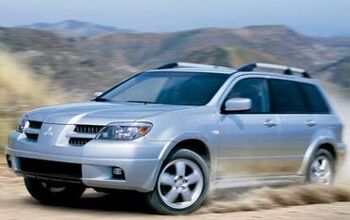New or Used? : The Blasphemy Of Accountancy Edition
TTAC commentator Gannett writes:
This has now become an important question around our house: what’s the best/cheapest (not necessarily the same thing) way to drive 25,000 miles a year?
My wife commutes about 90 miles a day round-trip. She has been driving a ’98 Crown Vic P71, but that’s getting to be about done. I want to get her something newer. So I start looking around, and there’re a lot of choices. But then I start running the numbers in my head. 25k miles a year. That’s 100k miles every 4 years. Holy crap. By the time whatever-it-is is paid for it may be mostly used up. Not good.
So now I’m in a quandary as to basic approach, and would appreciate the advice of you and the commenters. Not about which car to buy, but what the buy/sell strategy should be. Do we:
1) Buy new or near-new and trade in 1/2/3/4/5 years (not fond of this as I hate initial depreciation, but I’ll listen).
2) Buy an off-lease and trade in 1/2/3/4 years?
3) Buy something 1/2/3/4/5 years old and run it into the ground?
4) Buy something 1/2/3/4/5 years old and just keep it for one year?
5) ??
Does the question make sense? I’m trying to figure where in the vehicle’s lifetime to buy, and where to sell, to try and keep the capital cost per 25k miles, including depreciation, the lowest, but still keep reliability, etc., high. Fuel prices are not really under consideration – there you pay for the comfort/performance you want. I would probably want the sell-it mileage to not be more than 150k for reliability’s sake.
We’ve never dealt with this sort of annual mileage before (we moved out to “the country”) so this is unfamiliar territory. I know other folks have this situation. What to do?
Steve Says:
The smartest thing to do is expand your mileage expectations a bit.
Most cars these days with proper care will easily last over 200k, and a police interceptor like the one you have is often durable enough to get past the 300k mark. I have financed a lot of former police cars over the years and from my experiences, it’s easy to figure out why taxi companies use them in spite of the gas penalty.
They just don’t wear out and they take abuse better than nearly anything else out there. Even the new police cars don’t measure up to the Vic.
If you want to have a worry-free ownership then find a good independent mechanic and don’t cheap out on parts.
It’s that simple when it comes to these models.
If you’re still looking for a relative point where the depreciation is minimal and the longevity is respectable, I would say a 9 to 11 year old vehicle would be the ‘average’ sweet spot.
A rust free climate is a big help when buying the older aged vehicle. I bought two 03 models recently, an 03 Impala and an 04 Volvo XC70, and both of them will likely sell for about 15% of their new car price and I would roughly estimate that they have about 35% of their service life left.
But they are also both a bit over 150k. Five years ago the 8 year old vehicle with 100k miles was the sweet spot. Now for the same money, it’s somewhere around the 10 year mark with a spread between 135k and 165k on the mileage.
Sajeev Says:
I don’t believe people own a car perfectly suited to their pocketbooks, short term or long term. Too simplistic. But this isn’t about owning a Camry and lusting for a Ferrari; this feeling is far, FAR more mundane. The lure of newer Panther Love (5 year old Town Car vs. a beat up P71) or any scenario that surprises and delights is stronger than a strict budget for the next 8+ years of use.
Your eye will wander and you’ll think, “I coulda had this instead and not pay much more for it!” If we recommend a Corolla to replace the Crown Vic and you hate the seats after 6 months, will you keep it for long? Not likely.
To avoid future email saying, “thanks for the advice guys but it was wrong, now I need a new car” I’m asking you to narrow down the parameters. The intangibles. The things that make us human beings, not robots! Get something you’ll actually like for this time period. A car that, flaws intact, will still be interesting enough to avoid the lure of newer metal. Panthers are good at that…if you actually like Panthers.
My gut is telling me to recommend a 2-3 year old Camry, Fusion, Accord, Altima or just about any other mainstream family sedan with a proven track record for reliability and (somewhat) low cost of ownership after 100,000 miles. The Camry is kinda numb and isolating, so maybe that’s the best for someone who likes the ride of a Panther. Again, if you actually like the ride of the Panther.
Catch my drift? Don’t even bother running the numbers until personal preferences are matched to test drives.
More by Sajeev Mehta and Steve Lang
Latest Car Reviews
Read moreLatest Product Reviews
Read moreRecent Comments
- TheMrFreeze I don't doubt that trying to manage a company like Stellantis that's made up of so many disparate automakers is a challenge, but Tavares asking for so much money is simply bad form. With the recent UAW strike and the industry still in turmoil, now is not the time. And as somebody with a driveway full of FCA products, I'd just like to say how much I miss Sergio and FCA. At least with him Chrysler and Dodge stood a chance of long term survival...
- TheMrFreeze None of my cars are worthy of actual summer performance tires but our daily drivers do run all-seasons from about now until November, then winter tires the rest of the year because we're well into the snow belt. I always make sure the all-seasons I buy have good winter tire performance too, just in case we get caught with a very late or early winter storm
- Akear The front reminds me of the Pontiac Aztec, though it does look better than that infamous vehicle. I predict they will sell about 5,000 of these annually.
- Chris Teague I'm putting the Pilot Sport 4s back on my GR Corolla next week, so all of New England can thank me for the late spring snow storm we'll undoubtedly have right after that.
- 285exp I am no less interested in buying an EV this year as I was last.

































Comments
Join the conversation
However you get it, get your wife something nice. She will be spending a lot of time in this car and having goodies like Nav, heated/cooled seats, good sound system, etc makes those long hours shorter and more comfortable.
I hate sounding like my father but in this case his tastes for vehicles is almost ideal for you. I would buy used, I would buy 10 years old used. Maybe even older. Most importantly I would find a good independent mechanic that probably specializes in one brand. Hopefully either the Ford Crown vic and it's brothers or Lexus LS specialist. In your case I would buy a 1999-2000 Lexus LS with about 80-120,000 miles on it. Drive it one year and then sell it (AT THE SAME PRICE YOU BOUGHT IT) And get a newer 2001 lexus LS with about 80-120,000 miles on it and repeat. Just keep doing that, you'll get a constant change of vehicles that are pretty much dead reliable, hopefully you have a good local mechanic. Dallas area has a great specialist in Lexus. My point being that if you buy these high end vehicles at the year where the depreciation curve flattens you can essentially add miles and only pay for maintenance and fuel. You can then keep buying/selling vehicles at the same price and not lose anything. Of course there are a few things like state taxes and fees to worry about but maybe you make it every 2 years. Still my premise is sound, you can essentially drive the car for free and only pay fuel bills/maintenance.